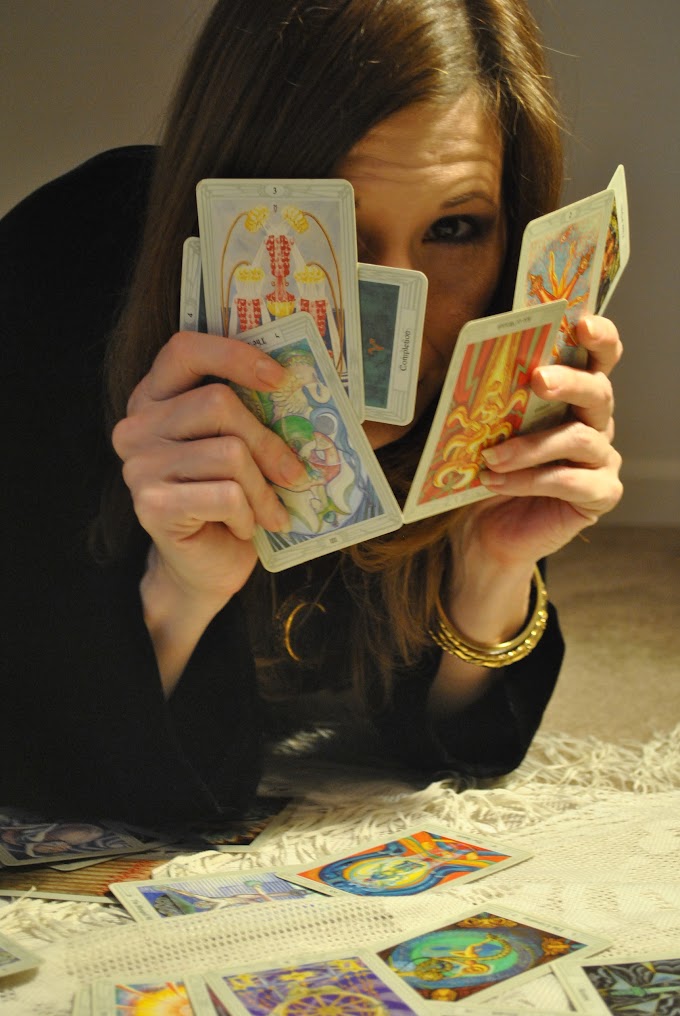
"...This is the paradox of vision: Sharp perception softens our existence in the world." -Susan Griffin (b. 1943), U.S. author and feminist.
Gossip! Shrew! Bitter old woman! Possibly you've heard she's a bitch, a widow, or an old maid. These are typical of the associations you might find digging around old tarot books for the Queen of Swords. Waite's divinitory meanings for this card are: "Widowhood, female sadness and embarrassment, absence, sterility, mourning, privation, separation." Reversed: "Malice, bigotry, artifice, prudery, bale, deceit...A bad woman with ill-will towards the Querent." Nice, right? One of the effects feminism has had on tarot can be found in the more updated meanings of this queen, as these older meanings, I believe were more a result of the patriarchal disparagement of a woman who exhibits her strong qualities than of a true assessment of her character.

This woman is sharp witted, very astute, nothing gets past her. She has an extraordinary bullshit detector. Most times, she'll let you slide with nothing more than a knowing look, but if she thinks you've gone too far she'll call you out and you will shrivel under the glare of her pointed words that unveil your duplicity as easily as slipping the skin off a ripe banana. She's brilliant and perceptive, with a strong intuitive sense that, combined with her ability for rational thought makes her seem almost psychic. Mostly it comes from the fact that she is a keen observer and she understands the interaction of the human psyche with behavior and emotions such that she is able to accurately predict what another person is likely to do. The element of the tarot queens is water, the emotional, life-nourishing force that navigates and flows throughout human interaction. The Queens, like their historical counterparts, are natural diplomats and negotiators due to this watery element to their natures. This queen's suit element is air, the element of active thought, communication, and conflict. She is "water of air" where the water tempers the non-emotional logical air and softens the icy blast with a humidity that quenches the breath.
So where did she garner such a negative reputation? Wisdom of her kind often comes from sad experience. She has often been through some fairly tragic life trials and has come away understanding much about human nature and herself. She is independent and sometimes prefers her own thoughts to the company of others. She isn't emotionally dependent and as such is happy with or without a mate. True, her sharp mind and tongue can wound when directed in anger. This woman can be spiteful, mean, and verbally abusive if she is crossed. Her preferred tactic would probably be more an icy silence that speaks more than words ever could. She is not above telling tales about one who has betrayed her, so by far she's not always someone you can trust.
This queen is undoubtedly one of the most feminist queens in the deck, not that each of them don't have their strong, womanly attributes, but she is one who patriarchy once disparaged for precisely those strengths and has come to be recognized for her true character and celebrated for the talented and critical-thinking woman that she is. Her meaning in tarot has evolved the most of all the queens in tarot due to the raising of feminist consciousness among the general population and among tarot readers specifically who, being predominantly intelligent women in their own right, could not abide the slander of the mighty Queen of Swords.
Robin Wood Tarot by Robin Wood Copyright 1999 Published by Llewellyn Worldwide
The Gilded Tarot by Ciro Marchetti Copyright 2004 Published by Llewellyn Worldwide




















Huzzah! And Huzzah, again!!! I love that Susan Griffin quote at the top. Wonderful exploration of a much maligned card.
ReplyDeleteQueen of Swords is one of my significators. I have an affinity for her. It has always annoyed me to find predominantly negative meanings for her. All courts have both positive and negative and this one seemed to garner such overwhelmingly negative meanings, I smelled a rat. Independent, smart, strong women have often been called "bitches" -- so there was the reason. I won't deny her negative traits, they are every bit a part of her, but why should they be emphasized any more than the positive? Waite's meanings show her a sad case whether upright or reversed. What the heck?
ReplyDeleteI really like this interpretation. She definitely gets a bad rap - always looking dour and grim. Her virtues are always glossed over in favor of descriptions of her as "unhappy."
ReplyDeleteI think your description is truer to the spirit of the Swords suit. She *is* a Queen, after all - about time she got some respect!
Hi Ginny, loving your blog. Been reading it from the beginning til this post (and continuing). Sorry to bother, but you didn't mention the possible interpretations of this if it were to come up as you've done with all the other court cards.
ReplyDeleteHi Janett :) No, I didn't do that with this card but that's because these are just blog posts. I will do that in the extended versions I am planning for a book.
ReplyDeleteOhh, that sounds wonderful. Don't keep us waiting too long for it! :)
ReplyDeleteThis is me!
ReplyDelete